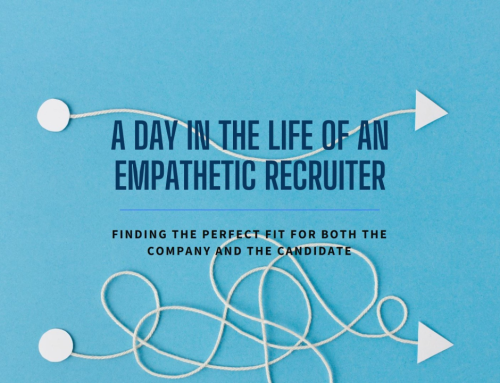Something is rotten in the state of modern sourcing.
The sourcing community at large is brilliant. When I was in Budapest last year at SourceCon, the world’s largest sourcing get together, I’d never experienced the types of familial bonds they shared when I’d been to broader, general recruiting conferences. They were supportive, actively encouraging and welcoming. It is a testament to the organizers who strived to produce an inclusive, collegiate environment and curated brilliant content. However, there was, and is, a subset of the sourcing community that is quite different. The broad smiles of welcome are replaced with the sneers of a sub-culture within a culture.
Much like engineering has its programmers who cultivate their own personal worth in response to a mediated glamorization of their technical skill set, the world of sourcing has similar cliques. Even in the wider realm of recruitment, sourcing is a little at odds with itself. For a while, as an emergent skill set it struggled to shake off the mantle of being perceived as somehow “junior” to the more established world of recruiters. For some in the community the response to this has been to diligently reshape that perception, to offer evidence to aid the understanding that the new sourcers weren’t like the one’s of old. The skills they wielded were new, an amalgam of tech, marketing and tools utilised in an almost artistic way. By far this is the majority of the sourcers I have interacted with. They want to aid the process of recruitment, their interactions with candidates make the process better for employers and candidates alike and the way they go about finding potential employees can be amazing and from an external viewpoint looks like fun.
It’s a small minority of sourcers that have taken that skill set – the ability to find a name or an email address and massively mythologized it. Like the record store employees who would sneer at someone making the “wrong” choice. Obsessed with the thrill of the chase rather than the goal of the endeavor. They are happy to find the misplaced glory in the “how” of finding rather than the “why” they were doing it in the first place. What started as enthusiasm seems to have become all-consuming as “hacks” are traded in hidden away corners of the internet, the more obscure the method the more begrudging acknowledgment of their peers they’ll receive. Like a Sourcer Smaug with his pile of gold exchanged for the ego strokes of their equally compliment-hoarding peers.
I am fortunate to have worked with some excellent sourcers and unfortunate to have worked with some of the worst. For the best the ability to find information was a skill set. She had a great understanding of the web and the technical chops to find and exploit loopholes when she could. She knew how to use the tools that were available and when to deploy the right tool at the right time. When given access to new tools and systems she took time to learn their nuances and offered insight to others as she learned. As good as she was all of these skills were just the tools of a her trade they were the means to an end and that end was to engage with candidates we wouldn’t normally have found. It’s that simple. A brilliant Sourcer augments the team they work within, their ultimate goal isn’t to produce a list of names and contact details in Google Sheets it’s to ensure the best possible person is hired.
For the bro-sourcer this end goal of their effort lies dusty and forgotten. If it’s all about the candidate how can it be about him? There is not enough validation to prop up that fragile ego if “hiring someone” is the only goal. When I worked with someone like this he was content in the self-absorption of the process, his output was infrequent and unreliable. It didn’t matter that jobs were unfilled and hiring managers were annoyed as long as there was a new “cool tool” to use or a method of “hacking” to find someones email address (even when it was available in our own ATS already!). For the bro-sourcer the joy of chasing down what he perceived to be a hard to find candidate was almost masturbatory. The biggest problem was that this approach made the process harder than it had to be. The misdirected energy meant that hires went unmade and began to be a drag for the rest of the team. They would often have step in and make the hire by placing a well-written advertisement rather than hunting for the contact details of a host on AirBnB because “in one of the photos of the flat they have Python books” (no really!).
It’s hard to argue for taking the easiest path with someone who purposefully wandered into a deluded maze of their own creation at every opportunity. Constantly having to deal with the fall out of the “sourcing experiments” that the hiring managers saw as “inept” and “annoying” meant that the results just weren’t happening. The output that did happen was poor, the morale of the team damaged and the bro-sourcer seemed oblivious. Not just happy with the mediocrity of the output, he seemed to revel in it.
Having learned the lesson of trying and failing to manage my bro-sourcer as part of a recruitment team I worried that the days of working with the excellent Sourcer I’d known before were done. Was sourcing all this toxic now? SourceCon Budapest showed me this wasn’t the case there are some truly brilliant people associated with the cause. There are also those that continue to give sourcing a bad name. Those who’s will to bask in the spotlight and subsequent failure is so is quickly patched up with moving onto the next thing, a second, third and fourth “reinvention” of what is basically an unchanged methodology. My brush with a bro-sourcer ended with an ultimatum; leave the company or work with me on a performance improvement plan. The irony of the tools of “old HR” he despised being utilized to end the employment of a self-appointed “future of sourcing” isn’t lost on me.
A good recruitment team is a well-oiled machine, one that can use the tools they have to the fullest potential, work around them when necessary and produce a flow of qualified and employable candidates into a well-designed selection process. A great team can do this as a minimum and add skill sets in marketing, data analysis and above all empathy. It doesn’t take much to derail this and break down the trust that needs to exist in a high performing team. After we lost our dedicated Sourcer the team went on to hire over 100 people each (they did their own sourcing and scheduling too!), though now disbanded and moved onto other roles in the industry those that did the work keep in touch and remain friends with the managers and leaders of the companies they work with.
So how can you guard against hiring your own bro-sourcer? How can we not be suckered in to believing the hype that belies ineffective methods and wasted energy? I have an answer! If I’m ever hiring for dedicated sourcers to join a team in the future I’ll ask
“What’s the sourcing story you’re most proud of? Any strange routes you’ve taken to find a candidate?”
Then when they’ve finished telling me the epic tale of “purple squirrel” hunting I have a follow-up question.
“What was the name of the person who got hired?” All the sourcing chops in the world are for naught if there’s no hire being made and for me if that hire isn’t memorable it’s sure sign of a lack of engagement and empathy.
Because where the love affair with tools and the ego-boosting potential of hoarding some knowledge to feel superior begins is precisely the point that recruitment fails. Sourcing is about candidates. Recruitment is about candidates. I want to give all my candidates the experience I’d like to have and ensure that hiring managers see the best people they can. If ever the hiring process is more about the recruiter (or Sourcer) than the candidate something is amiss. What makes for the most effective recruitment teams is never the individual attributes of a single member, but the interactions within the team itself. Even the best team cannot support a self-appointed “ninja” who promises so much but delivers nothing. For a recruitment team this can be even more detrimental if that person is the Sourcer. Imagine every first contact with a candidate from the Sourcer needing to be followed up by a second from the Recruiter that apologized and had to re-brief the recipient.
I hope that the sourcing community can continue to be the amazing place I found it to be and to keep the larger egos in check as they rear their heads. If my SourceCon experience is anything to go by the excellent curation means that the bro-sourcers are being filtered out effectively – the sourcing community is the better for it.
Article Origin: http://thekingsshilling.io/an-uncomfortable-truth-about-sourcers/?fbclid=IwAR1kvStxiluAPro43lQ8rmnYtCLb8bz_GxIFfANiaNnfBBRu54gSY7gJvM0







Leave A Comment